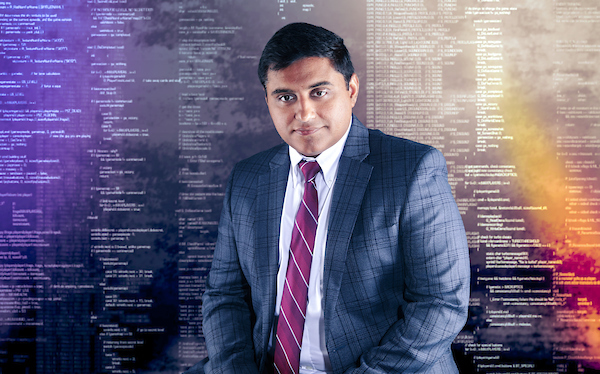Agarwal Receives National Science Foundation Grant to Make Social Media Safer

Dr. Nitin Agarwal, the Maulden-Entergy Chair and Distinguished Professor of Information Science at the University of Arkansas at Little Rock, has received a $95k grant from the National Science Foundation (NSF) to explore ways to make social media safer to use.
“The grant will help develop novel big data mining algorithms for a safer social media,” Agarwal said. “The main objective of this research is to identify and track malicious groups in real-world networks that hide in plain sight. This research proposes a way to identify key groups, investigate their interest, and predict their influence in the network.”
The one-year $95,227 grant comes from the NSF flow-through from Arkansas Economic Development Commission’s Division of Science and Technology. The grant will support a post-doctoral fellowship position, travel, and data acquisition.
Agarwal and his researchers at the Collaboratorium for Social Media and Online Behavioral Studies (COSMOS) Research Center at UA Little Rock, where Agarwal serves as the founding director, study how Online Social Networks (OSNs) have revolutionized how societies interact. While this new phenomenon in online socialization has brought the world closer, OSNs have also led to new spaces to facilitate cybercrime, cyberterrorism, cyberwarfare, and other deviant behaviors perpetrated by state and non-state actors.
“Due to afforded anonymity and perceived less personal risk of connecting and acting online, deviant groups are becoming increasingly common among socio-technically competent ‘hacktivist’ groups to provoke hysteria, spread mis/disinformation, coordinate cyber-attacks, and even effect civil conflicts,” Agarwal said. “Such deviant behaviors are categorized as the new face of transnational crime organizations that could pose significant risks to social, political, and economic stability.”
Social media is growing as a data source for cyber forensics, providing new types of artifacts that can be relevant to investigations. Since OSNs, hosted on platforms like Twitter, Facebook, YouTube, and blogs, are continuously producing data with tremendous volume, variety, and velocity. These newer forms of data, especially the communications of hacker groups on OSNs, would offer insights to coordination and planning. Practitioners must embrace the idea of using real-time intelligence to assist in cyber forensic investigations, and not just post-mortem data.
“We need to expand the traditional definitions of cyber threats from hardware attacks and malware infections to include such insidious threats that influence behaviors and actions,” Agarwal said. “Observable malicious behaviors in OSNs, similar to the aforementioned ones, continue to negatively impact society warranting their scientific inquiry.”
To stem access of malicious actors and limit their influence campaigns, decision makers often resort to limiting access to these platforms and sometimes even shut down the internet. These methods affect both benevolent and malicious campaigns alike. There is a need for efficient methods that detect coordinating groups of malicious users to dismantle their influence campaign networks.
Conventional methods have focused on identifying community structures in OSNs and are oblivious to these key coordinating groups and the various contexts in which they share interests. Moreover, as OSNs grow, groups reorganize, and the network structural properties change, making it difficult to identify these key groups and their information diffusion networks.
The outcomes of the research will be published in scientific journals and also as a publicly available web-based tool that will complement the suite of analytical tools developed by COSMOS, including BlogTracker, VTracker, and COVID-19 Misinformation Tracker, that have been recognized by the WHO and NATO as technological innovations to combat cognitive warfare.
“The grant will further create training opportunities for our students to build a data science workforce that can develop technically and ethically competent solutions to real-world problems,” Agarwal said.
